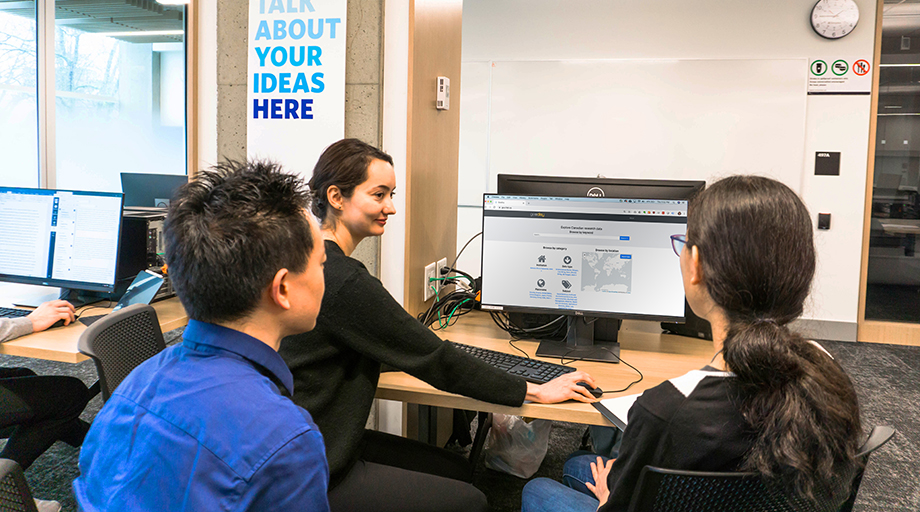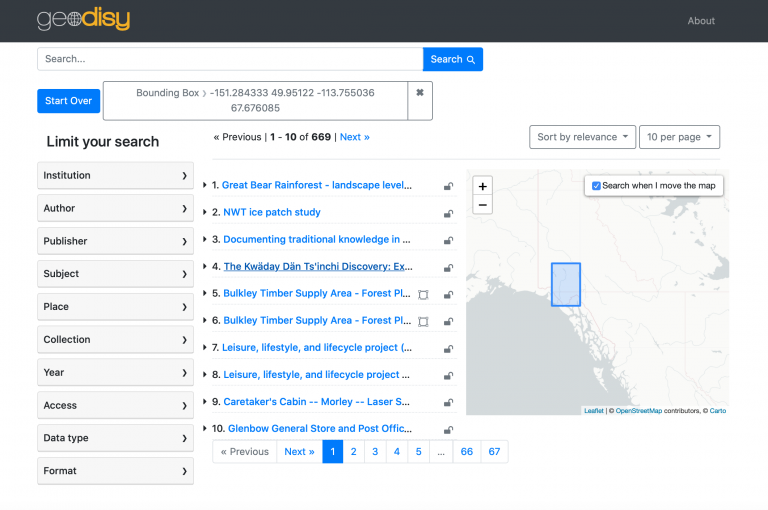
The UBC Library Research Commons has launched Geodisy, an open-source tool that allows users to search online for Canadian research data through map-based discovery. After UBC Library was named the successful recipient for the Research Data Management (RDM) funding call from CANARIE in November 2018, the team at the Research Commons worked in collaboration with partners at UBC Advanced Research Computing (ARC), McMaster University, University of Toronto, Simon Fraser University, Scholars Portal, University of Saskatchewan, and Portage Network to create a more robust version of their originally proposed federated geospatial data discovery tool.
The resulting software is an innovative solution to a unique problem faced by researchers across disciplines. “There is an increasing demand for geographic components in research, but most repositories allow for only text-based searching. We realized that discovery could be improved by providing a map-based search alternative,” says Mark Goodwin, Geospatial Metadata Coordinator at the Research Commons and core member of the Geodisy team.
“Visualizing data is being recognized as a powerful form of discovery. While map-based search portals are becoming common, most are focused on a particular domain or subject area. Geodisy is intended to be useful to a wide variety of users in different subject areas, including climate change, public health, community development, conservation, or any other research area that is tied to geographic location,” says Eugene Barsky, Principal Investigator for Geodisy and Head of the Research Commons.
Answering more complex research questions in a fraction of the time
As a current doctoral student in the UBC Faculty of Forestry, Ira Sutherland has already found Geodisy helpful in his work, which uses GIS and historical analysis to investigate critical sustainability questions. His research focuses on how the historical management of environments in British Columbia have contributed to problems seen today, like wildfires, collapsing salmon stocks and the depletion of First Nations cultural resources. “Compiling large amounts of historical spatial data, as I do, would not be possible without tools like Geodisy and open data initiatives,” says Sutherland. “With increased data availability, researchers like me will be able to answer more complex questions concerning sustainability and do it in a fraction of the time.”

Screenshot of Geodisy results page.
With Geodisy, users can simply adjust the map or draw a box directly it to bring up relevant records in an area of interest. Currently, Geodisy users have access to content from Scholars Portal Dataverse, a publicly accessible data repository platform, which houses data from dozens of Canadian institutions. Thanks to additional funding from Canada’s New Digital Research Infrastructure Organization (NDRIO), the Research Commons will be working with the team at the Federated Research Data Repository (FRDR) to expand Geodisy’s content and further integrate it with the FRDR national discovery service.
“This impressive tool is an example of one of the many ways UBC Library and academic libraries in general are playing a critical role in the development of a national digital research infrastructure ecosystem,” says Dr. Susan E. Parker, University Librarian. “Through our work with bodies like the New Digital Research Infrastructure Organization (NDRIO) and The Portage Network, the library and the expertise we offer is making a deep impact in the Canadian post-secondary research landscape.”
Get started using Geodisy by visiting geo.frdr-dfdr.ca or download the software from UBC Library GitHub. You can also learn more about the benefits of Geodisy through an upcoming webinar, hosted by Portage Network. Register now for “Introduction to Geodisy an Open-source Spatial Discovery Platform” on May 5, 2020, at 10 a.m. (PDT).
_
The UBC Library Research Commons is a multidisciplinary hub that supports research endeavours and provides training in research-enabling skills. We embrace both new and traditional exploratory scholarship and provide services, software, and expertise. Our services include expertise in digital scholarship, including geospatial and data services; welcoming space for projects and presentations; digital Scholarship Lab with powerful computers, for research, experimentation, collaboration, and work with big data; and consultations and workshops for UBC researchers.
This project is part of UBC Library’s strategic direction to advance research, learning and scholarship.
Learn more about our Strategic Framework.
